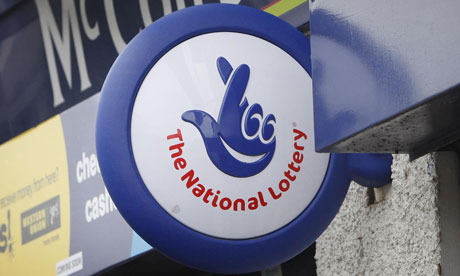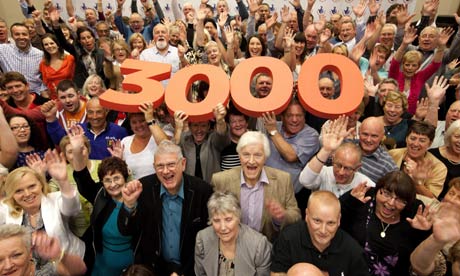Jonathan Freedland in The Guardian, 23/11/2011
Here's a game you can play at home. Ask your friends how much
they reckon the head of human resources at Cadbury, the chocolate
company, pocketed for the last year for which we have figures. In my
experience, the guessing will open at around the £100,000 or £150,000
mark. Then, realising that the answer must be stunning or else you
wouldn't be asking the question, people go higher, suggesting £300,000
or even £500,000.
Those who place their bet at that very top end
tend to smile at the absurdity of it, acknowledging in advance the
madness of such a high salary. So far, in two years of playing this
game, I have never seen anyone get the right answer. Which is that in
2008
Bob Stack, then head of HR for Cadbury, was rewarded with a package totalling £3.8m,
including £2m in exercised share options. The aptly named Stack retired
with all that and an £8m pension pot, paying him £700,000 this year and
every year.
It's a choice example, even if Cadbury, gobbled up by
Kraft, is, like Stack, no longer part of the British corporate scene.
No matter how inured you think you are to runaway executive salaries,
laid bare by this week's
report of the High Pay Commission,
that one makes the jaw drop. For Stack was not some master of the
universe CEO, heading up a global financial behemoth. He ran the
personnel department at a chocolate company. That's not a trivial job.
But a basic package of nearly £2m a year? It makes no sense.
Ask
people to pinpoint the problem and they might struggle to be specific.
They just find it appalling that, as the commission found, today's CEO
is often paid 70, 80 or over 100 times the salary of their average
worker, when three decades ago the ratio usually stood at 13 to 1. A gap
has turned into a vast, ever widening chasm.
Why does this matter exactly? You can't simply whine that it's unfair,
insisted the executive recruiter Heather McGregor on the Today programme. "Anyone over the age of seven who complains that things are not fair needs a reality check," she said.
Deborah Hargreaves, the High Pay Commission chair, is ready with
grown-up, hard-headed arguments for why runaway pay is bad for business.
When those at the top are getting so much more than their subordinates,
workers get demoralised, Hargreaves told me; absenteeism increases, and
staff refuse to engage with management or support the corporate
mission. When the average salary has increased just threefold over the
last 30 years, it makes workers sullen and resentful to note that, say,
the
head of Barclays has seen his pay rise by nearly 5,000% over the same period.
Free-wheeling
capitalists should be particularly alarmed, says the commission.
Gargantuan executive pay is sapping enterprise: people who might have
been risk-taking entrepreneurs have no reason to start their own
businesses when they are so comfortably looked after at corporate HQ.
And of course such winner-takes-all rewards warp the wider economy.
Housing in London is just one example. The bonus boys have driven up
prices at the top end, pulling the whole housing market out of reach of
would-be first-time buyers at the other end. It's trickle-down economics
at its worst: the wealth of the rich doesn't cascade downwards, but its
corrosive consequences do.
Defenders of the wealthy brush aside
such talk, certain their critics' real beef resides elsewhere, in envy
or a retro-communist desire for uniformity. "Move to Cuba" was
McGregor's most succinct soundbite.
In one way she's right:
concerns over worker demoralisation and reduced entrepreneurial spirit
do not lie at the heart of the matter. Our objection to telephone-number
salaries goes deeper. What it comes down to is desert – a notion so
deeply ingrained that, yes, even a seven-year-old can grasp it: the
belief that people should deserve the rewards they get.
That's why
the "move to Cuba" remark was so off beam. Most people have long
accepted that there will be a differential in pay that, in the hoary
example, the brain surgeon will earn more than the dustman. People
understand that some skills are rare and therefore command a greater
premium. They even accept that this can result in extreme outcomes, with
the likes of
Wayne Rooney trousering £250,000 a week. But none of that logic applies to the current state of corporate pay.
Rooney
is truly a one in a hundred million talent; there might be just two
dozen people in the world who could match his skills. But with all due
respect to Bob Stack, that is not true of him. Nor can it possibly be
true of the 2,800 staff in 27 UK-based banks who, according to the
Financial Services Authority, received more than £1m each in 2009.
Whatever these people are able to do, it's clearly not rare.
Jonathan Freedland in The Guardian 23/11/2011
Ah,
comes the reply, but these are the cream of the international crop,
among the very best bankers in the world. The commission report blows a
hole in that tired argument, revealing there's hardly any cross-border
poaching of corporate talent. Not many of our monolingual high earners
could work abroad and even fewer would want to. They like it here and do
not have to be paid lottery jackpot money to stay.
So rarity and
competition can't justify these rates, and nor can any old-fashioned
notion of desert: there is no society-wide consensus that says these
people do such valuable, critical work they deserve their riches. On the
contrary, we lament that the City lures maths and science graduates who
might otherwise have become great engineers or scientists, paying them
instead to move digits on a screen producing nothing of any discernible
value whatsoever.
When reward slips its moorings from merit, this
surely poses a danger that goes beyond our economic prospects. What
message are we sending the next generation of Britons? Why should they
aspire to become a surgeon or a headteacher or a judge, when those once
top-paid jobs now earn a tiny fraction of the salary attached to a
relatively cushy, low-risk seat in the boardroom or on the trading
floor?
Strikingly, the commission found that even the
mega-earners do not kid themselves they deserve their pay. They admitted
that they had got lucky, that they worked no harder and risked no more
than those earning much less. But they did think they were "entitled" to
what they got. Hargreaves draws no parallel with the August rioters,
except that they "showed that same sense of entitlement, that they could
take trainers or a TV, as those bankers who thought they could take a
bonus, even if they had brought a bank to its knees".
The
commission has plenty of bright ideas for change. Ignore the City bleats
that meaningful action has to be international, which sadly is
impossible: action has only been impossible up till now because the UK,
batting for the City, has blocked any EU attempt to tackle high pay. But
the larger change will be cultural. We need to revive the lost notion
of merit and desert, to make those bagging huge, undeserved salaries
feel a sense of shame or at least loss of reputation at such unwarranted
rewards. We have the Fairtrade scheme, so why not a Fair Pay kitemark
granted only to products made by companies who pay defensible rates?
Such a seal of approval should be given only sparingly – only to those
who have really earned it.


 154 Comments
154 Comments




